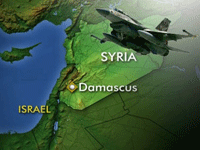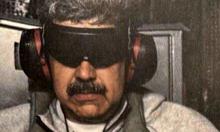Syria develops its own nuclear program?
 It seems that Syria does have serious "nuclear troubles." If earlier the country was blamed for the secret development of a nuclear program by Israel alone, now the Americans have joined these charges. The Washington Institute for Science and National Security (ISIS) has recently published a series of photographs made from spy satellites that captured strange building in Syria. In this regard, U.S. experts do not rule out the fact that they are secret nuclear facilities.
It seems that Syria does have serious "nuclear troubles." If earlier the country was blamed for the secret development of a nuclear program by Israel alone, now the Americans have joined these charges. The Washington Institute for Science and National Security (ISIS) has recently published a series of photographs made from spy satellites that captured strange building in Syria. In this regard, U.S. experts do not rule out the fact that they are secret nuclear facilities.
In particular it concerns an object located at a military base near the town of Marj al-Sultan. According to the American side, it was intended to be used for the enrichment of uranium from a special concentrate called "yellow cake." From there, Syrians allegedly planned to deliver the ready raw material to the reactor at Al Kibar (Dair al-Zure) destroyed by Israeli aircraft in September of 2007. According to the intelligence services of the Jewish state, North Korean experts helped the Syrians to build the reactor. Some of them were killed during the Israeli strike.
Yet, there is more to it. In addition to Marj al-Sultan, two more nuclear facilities meant to serve the needs of Al-Kibar were identified in Syria. It is worth mentioning that earlier Damascus has flatly refused to let IAEA inspectors on its territory to verify reports that Syria was developing its own nuclear program.
Certainly, this has caused further suspicions about the true intentions of the Assad regime. With regard to the Syrian-North Korean relations, in the last 15 years they have evolved incrementally. The Syrians regularly visit North Korea stopping by the DPRK's nuclear facilities.
This breeds a suspicion that Syria, with the support of North Korea, is also developing nuclear weapons. How significant is the risk that there will be another nuclear power in the Middle East besides Israel? Vladimir Khrustalev, an expert on nuclear technology with Maritime University answered this and other questions in an interview with Pravda.ru.
"North Korean trace looks particularly suspicious in this story. What are the interests of the DPRK in Syria?"
"With regard to the role of the DPRK in this story, it is not a direct enemy of Israel. Pyongyang in this situation just makes money any way it can, as it does not have that many opportunities to do so. At the very least, aiding other countries in developing missile and nuclear technology is one of them. Especially considering that in this respect Syria is still far from the level of North Korea.
"Does this mean that we cannot rule out that the Assad regime has decided to acquire a "nuclear club"?"
"Syria may indeed be motivated to acquire nuclear status because it is markedly inferior to Israel in terms of conventional weapons. The empirical evidence shows that it could not adequately resist Israel in an open war.
As evident from the example of North Korea, possession of nuclear weapons reduces the likelihood of the aggression by hostile countries. It seems that many want to follow this example. It is one thing to attack a country that is not capable of reflecting the attack, and quite another thing to attack the state whose leadership is able to use nuclear weapons in response. It is a psychological barrier that is difficult to overcome.
"What would Syria's refusal to allow IAEA inspectors to check for suspicious objects result in?"
"In the short term there is no serious threat for Syria so far, because Damascus has not even been offered to host a "special inspection" of IAEA. Only in the event that Assad refuses to accept it, the UN Security Council will gather. This, again, does not guarantee introduction of sanctions against Syria under these circumstances because there is no guarantee that China will vote in favor of sanctions.
It seems that Syria is now just dragging out time. It has an opportunity to do so, considering the red tape of the IAEA and the UN. Even if the international experts find something they will have to prove that certain objects are military rather than civilian. In addition, Syria has not signed any document that would oblige it to full transparency and full inspection regime of suspicious activity."
"Will the United States and, especially, Israel, have enough patience?"
"If the Syrians are able to exploit the situation and prolong the dialogue with the IAEA, and the Israelis will have compelling evidence that Assad is trying to create nuclear weapons, they can very well strike at potentially dangerous objects. They would not necessarily act like they did in 2007, that is by means of a military operation. It is quite possible that they will do without air raids, using the usual sabotage by agents and such."
Sergei Balmasov
Pravda.Ru
Subscribe to Pravda.Ru Telegram channel, Facebook, RSS!





